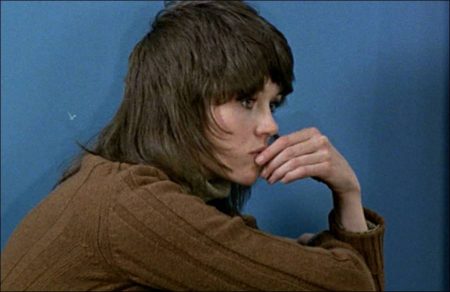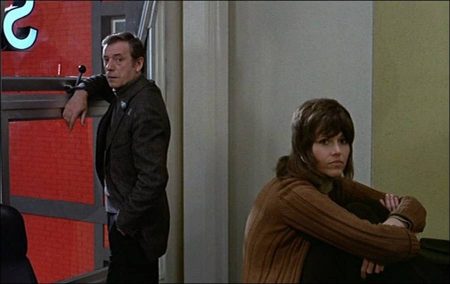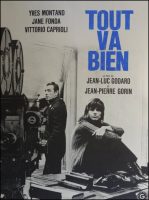Tout va Bien is set in 1972, i.e. four years after the “events” of 1968. President De Gaulle and his successor president Pompidou had rolled back the would-be revolution and the political right wing held France in its grip. And yet “everything’s fine” (Tout va Bien). Relations between people have changed. A factory is occupied, a woman striker phones her husband and tells him to mind the children, a Communist Party militant sells party literature in a supermarket and is ignored by young people (his party dominated the left before 1968).
Tout va bien is a 1972 French-Italian political drama film directed by Jean-Luc Godard and collaborator Jean-Pierre Gorin and starring Jane Fonda and Yves Montand. The film’s title means “everything is going well”. It was released in the United States under the title All’s Well and internationally under the title Just Great. The Godard/Gorin collaboration continued with the featurette Letter to Jane as a postscript to Tout va Bien.
Jean-Luc Godard dissects the structure of society, movies, love and revolution. He asks compelling questions: Can love survive a relationship? Can ideology survive revolution? He also looks at the French student riots of the 1960s with a critical eye, and ends up satirizing contemporary views of history. A battery of thoughts complete with criticism of modern society and movies.

Overview of the Film
The film centers on a strike at a sausage factory which is witnessed by an American reporter and her French husband, who is a director of TV commercials. The film has a strong political message which outlines the logic of the class struggle in France in the wake of the May 1968 civil unrest.
It also examines the social destruction caused by capitalism. The performers in Tout va bien employ the Brechtian technique of distancing themselves from the audience. By delivering an opaque performance, the actors draw the audience away from the film’s diegesis and towards broader inferences about the film’s meaning.
The factory set consists of a cross-sectioned building and allows the camera to dolly back and forth from room to room, theoretically through the walls. Another self-reflexive technique, this particular set was used because it forces the audience to remember that they are witnessing a film, breaking the fourth wall in a literal sense. This type of staging was appropriated from Jerry Lewis’s film The Ladies Man. Godard and Gorin use other self-reflexive techniques in Tout va bien such as direct camera address, long takes, and abandonment of the continuity editing system.
Tout va Bien (1972)
Directed by: Jean-Luc Godard, Jean-Pierre Gorin
Starring: Yves Montand, Jane Fonda, Vittorio Caprioli, Anne Wiazemsky, Éric Chartier, Pierre Oudrey, Marcel Gassouk, Michel Marot, Hugette Mieville, Yves Gabrielli, Natalie Simon
Screenplay by: Jean-Luc Godard, Jean-Pierre Gorin
Production Design by: Jacques Dugied
Cinematography by: Armand Marco
Film Editing by: Claudine Merlin, Kenout Peltier
Music by: Paul Beuscher
MPAA Rating: None.
Distributed by: Gaumont Film Company
Release Date: April 28, 1972 (France), November 30, 1972 (Italy)
Visits: 193

